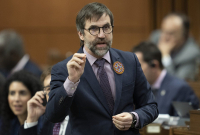Tailings scandal puts polluting corporations in MPs’ crosshairs

MPs lambasted federal and provincial governments in question period Friday for failing to hold polluting corporations accountable in the wake of tailings leaks in northern Alberta.
Imperial Oil’s Kearl oilsands project leaked toxic effluent on the lands and waters of the Athabasca Chipewyan First Nation (ACFN) for nine months without notifying downstream communities, all while the corporation continued to lobby the federal government for more subsidies, Green Party Leader Elizabeth May told the House of Commons on March 10.
“Our prisons are overrepresented with Indigenous people, which means they are underrepresented with corporate criminals like the CEO of Imperial Oil,” said May. “When will this government stop subsidizing Big Oil and get tough on corporate crime?”
Last week, Chief Allan Adam of ACFN called out Imperial Oil and the Alberta Energy Regulator for failing to notify the nation of an oilsands tailings leak reported to the regulator last May. For months after Imperial identified seepage from four tailings ponds, community members harvested, fished and hunted on the lands, unaware of the situation, Adam said.
ACFN surveyed and photographed the remediation area, which had no fence around it, and three moose within 100 metres of an ongoing leak, according to a March 8 statement from the ACFN.
“In Alberta, Indigenous communities are pushing back on mega corporations like Imperial Oil who are polluting our land and jeopardizing our health, but the Liberals turn a blind eye and Premier [Danielle] Smith rewards them with billions of dollars,” NDP MP Blake Desjarlais said in question period on Friday.
Last week, May and Desjarlais joined Chief Adam in characterizing the situation as environmental racism. Toxic waste created by oil companies in the Alberta tarsands is stored in tailings ponds, though May says the term “ponds” is misleading because over 1.4 trillion litres of tailings fluid sprawls over an area 2.6 times the size of Vancouver.
“Delaying justice is denying justice,” Desjarlais told the House, asking when the federal government would take Indigenous rights seriously and close environmental loopholes.
In response, Indigenous Services Minister Patty Hajdu said it is “appalling” the Alberta government knew about the leak at Imperial Oil’s site for months and that neither the company nor the regulator informed the Indigenous people who rely on those lands and waters.
“We have to do better, and we will,” said Hajdu.
Earlier this week, Alberta’s premier suggested this was a communications issue and said the leaks have not affected drinking water. This was similar to Imperial Oil’s response to Adam and the ACFN, which expressed regret that the company’s “communications did not meet the expectations of the ACFN community” and committed to improving communications.
“This is much more than a simple communications issue,” Adam said in a statement released March 8. “This is an environmental catastrophe that the AER and Imperial Oil tried to cover up and now the premier and the minister are trying to minimize… Right now, all we are getting from the premier is spin and obstruction from Imperial.”
On March 8, ACFN said Imperial has officially denied the nation's request for monitors to access the site.
On June 3, 2022, Imperial Oil informed the AER that wastewater had entered a fish-bearing body of water, which the regulator should have flagged as a violation under the Fisheries Act, the ACFN’s statement says.
On March 9, federal Environment Minister Steven Guilbeault told reporters in Ottawa it's “very worrisome” that the AER didn’t notify Environment Canada or Indigenous nations for over half a year. Such events are supposed to be reported to the federal government within 24 hours, he said.
“There is an active investigation by the enforcement branch of Environment and Climate Change Canada… When they’ve concluded the investigation, it will be communicated publicly,” said Guilbeault.
This week, he spoke to leadership from ACFN and the Mikisew Cree First Nation and pledged to “work with them to find solutions, permanent solutions.”
The Northwest Territories has said Alberta violated the terms of their bilateral agreement, which obliges either party to let the other know about anything affecting water quality. The territory has initiated the agreement's dispute settlement mechanism.
— With files from The Canadian Press
Natasha Bulowski / Local Journalism Initiative / Canada’s National Observer






Comments
This is disturbing news to say the least. Shame on the AER (Alberta Energy Regulator) Imperial Oil and the Alberta government who all had to know but failed to communicate this leak to the Federal Environment Minister and the Athabasca Chipewyan First Nation (ACFN). Let's hope that the active investigation by the enforcement branch of Environment and Climate Change Canada concludes with utmost speed and that the Federal Govt. takes the absolute maximum measures to punish the guilty party(s). It would be an ideal time to rethink subsidies to the Imperial Oils of the world and to the provincial governments who continue abusing the environment like it's the "Wild West". Despite the slick oil sand industry greenwashing commercials, apparently it still is. "Earlier this week, Alberta’s premier suggested this was a "communications issue" I find Danielle Smith and her comments totally lacking in any credulity.
This scandal needs to become an Alberta election issue. The UCP will ignore the issue unless it circles around the press for so long that Smith will try to laugh it off as a minor issue. Nothing to see here. There is much doubt that the provincial NDP will run with it because they will inherit the problem if they win. They are also as oiled up as the UCP, so acting like the opposition role it should be playing on hot issues concerning the government's actions (or lack thereof) will probably be dampened down with a wet towel.
That leaves the press and enviros. Postmedia newspapers are all about oil, so I don't see anything more than a flare up story in the Calgary Herald that will quickly be doused. That leaves the CBC, the Globe and possibly some local papers that are able to talk with enviros and First Nations and try to get commentary from Smith's government and the oil industry for balance. The National Observer needs to run with this one.
Yet this is an old story. About 20 years ago a U of Alberta hydrologist (Dr. Schindler) conducted tests on the waters downstream from the tailings lakes and found a witch's brew of toxins in the water and soils. I believe he also correlated cancer rates and contamination of Indigenous food sources from the land and waters with the oil sands operations pollution. His report was dynamite to the Alberta government of the day (Ralph Klein?) who tried to suppress it and publicly disparaged Dr. Schindler. The suppression became news along with the effects of downstream toxins on Indigenous communities.
Dr. Schindler's work included joining glaciologists to research the effects of atmospheric heating on glaciers in the Canadian Rockies. One conclusion that stuck out was that if the then rate of melt continued unabated (it was lower 20 years back during his study), glacier-fed Prairie rivers will lose about 50% of their summertime volume by mid-century, and more as the decades roll by. Keep on mind that Alberta's cities mainly obtain their drinking water from the rivers that flow out if the mountains. Calgary's Ghost Dam on the Bow River and the Glenmore Dam on the Elbow River are prime examples. Ditto agriculture.
Then Alberta doubled down on oil.
GeeWiz, Who wouda thunk it?
Imperial Oil aka EXXON who is on the ESG list! What could possibly go wrong?
How can their disgusting grand polluter’s behaviour not match their pretensions on their glossy prospectus?
It had to be a communication problem, who could possibly doubt it?
Obviously, the solution is to rewrite the prospectus in glossier terminology and increase the bonuses of the PR managers and demand more public money to support their efforts. In other words, will kill you but with more compassion next time .k? We’ll try less stabbing in the future.
That would certainly improve Imperial Oil ranking on the ESG list next time.
Imperial's take on a definition ...
ESG: Escaping Science and Government.
The definition doesn't quite hold when CAPP has their hands out when lobbying federal ministers.
Good one.